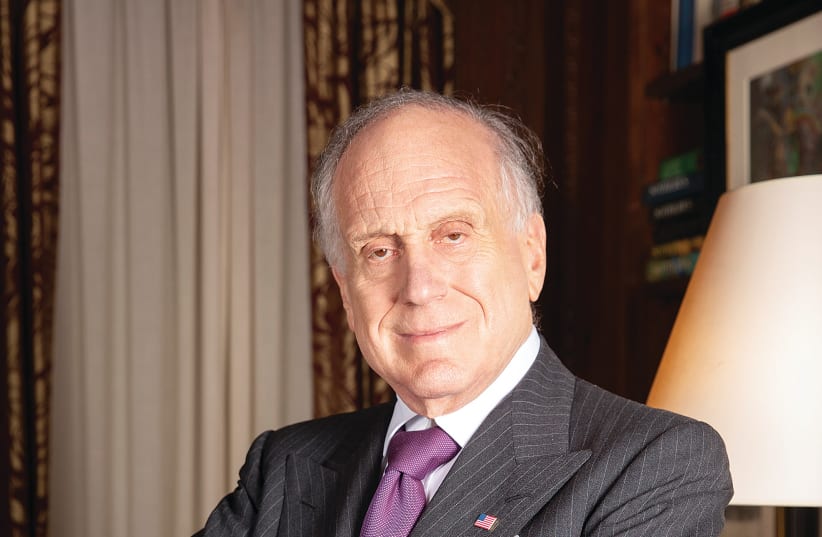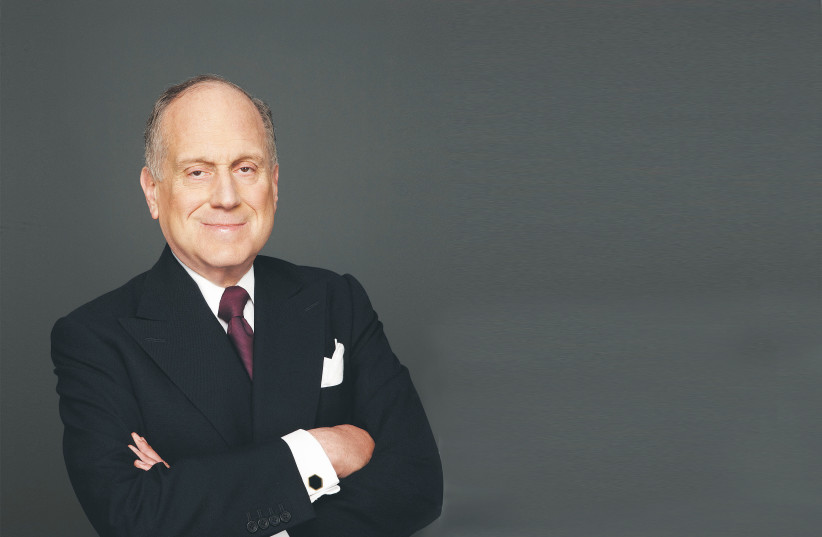Ronald S. Lauder, who has served as president of the World Jewish Congress since 2007, possesses a powerful voice of moral clarity, wielding influence on a wide range of issues related to Israel and the Diaspora, particularly in the US, where he is based.
As president of the WJC, which represents Jewish communities in 106 countries, Lauder meets regularly with heads of state, prime ministers and government representatives to discuss and advance causes of concern to Jews and Jewish communities internationally, and does not hesitate to speak out. He advocates for the importance of supporting Israel, especially in times when the state or its citizens are under attack, and he encourages and aids the development of vibrant Jewish communities around the world.
An international philanthropist, investor, art collector and former public servant, Lauder demonstrates his deep commitment to his Judaism through numerous philanthropic endeavors in Israel, the US and around the globe.
- See No. 6: Entertainment industry leader
- See No. 8: Representing the US in the world
- See full list
- See 2021's list
From 1983 to 1986, Lauder served as US deputy assistant secretary of defense for European and NATO Affairs, and was appointed US ambassador to Austria by president Ronald Reagan in 1986. In that role, he built strong diplomatic bonds between the US and Austria.
In 1987, he established the Ronald S. Lauder Foundation, which supports Jewish schools, camps and community centers in Austria, Belarus, Bulgaria, the Czech Republic, Germany, Greece, Hungary, Poland, Romania, Slovakia and Ukraine.
Lauder was elected president of the Jewish National Fund in 1997, and after a successful 10-year tenure, became chairman of the board, a position he still holds. Jewish National Fund-USA launched two employment centers in his honor – the Lauder Employment Center in the Negev and, more recently, the Lauder Employment Center in the Galilee, to attract hundreds of thousands of new residents to southern and northern Israel.
He also serves as chairman of the Auschwitz-Birkenau Memorial Foundation, which supports the preservation of the remains of the former German Nazi death camp.
How do you see the world, especially the Jewish world, in 2022?
The world is a very dangerous and volatile place right now, on almost every front: a raging war, an energy crisis in Europe, an ongoing endemic, disinformation and political polarization.
The Jewish world faces all of those challenges, but it also faces a growing threat from soaring Jew-hatred that’s unchecked on social media. And it is festering in academia and on college campuses, where the antisemitic, anti-Israel BDS movement is growing, Frequently, pro-Israel students and faculty are under fire, simply for expressing their love and support for the Jewish homeland. Every day, there are reports that Jews are attacked on the streets. And the majority of Jews report that they do not feel safe.
But I am proud of our resoluteness, strength and resolve. And I am optimistic. I believe that our people’s mix of strength, innovation, compassion and warmth gives us the tools we need to navigate through all of these adversities, and prevail.
Fast forward 10 years. How do you envision the future of Israel and the Middle East in 2033?
We need a Marshall Plan for the Middle East, which means peace through shared prosperity. A safer region due to an expanded Abraham Accords – and a peace based on economic development between Israel and its new partners and the Palestinian people. Global investments in Palestine in education, health care, infrastructure and tech.
What do you see as a fair and acceptable solution by all sides to the ongoing problem in the egalitarian plaza of the Kotel?
Orthodox, religious and secular Jews must stand together, unified. We must all respect the way the other worships. We are one people with one God and one country, and we must stand by each other and celebrate each other, no matter the synagogue we worship in, our gender or the side of the plaza we chose to pray on. The Kotel belongs to Israel, and Israel belongs to the Jewish people. We must all enjoy the freedom to pray and celebrate and mourn, without a wall separating us. Divided we fall, united we stand.
What can be done to stem what appears to be rising antisemitism and anti-Israel sentiments, especially among the young generation?
First and foremost, it’s education. Educate the upcoming generations in schools, colleges and at home about the Holocaust and the dangers of hate. Make it clear through our leaders and in the media that culturally there is a penalty to pay for expressing hatred of Jews or hatred toward Israel. We must make trafficking in Jew-hatred and denying the Jewish homeland’s right to exist unpalatable, career-ending and reputation-destroying.
What do you think are the biggest challenges facing Israel and the Jewish people today?
There are two grave threats above all others: first, Iran. Iran is hell-bent on destroying the State of Israel and the Jewish people and a path to a nuclear Iran remains open. Furthermore, the details that I have read and briefed on the unfinished Iran deal do not go nearly far enough in keeping Iran firmly in check.
Second, apathy. Too many – Jews and non-Jews alike – think that the long-term security of the Jews and Israel is assured. It’s not. Hatred is on the rise, acts of hate, violence and terrorism are a weekly reminder that every Jew and every gentile has a part to play in fighting back.
Hatred of Jews is hate – and hate is a public safety crisis.

